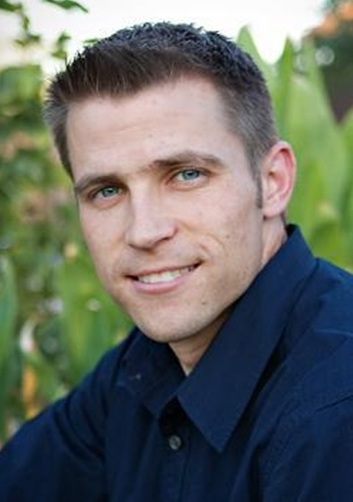Arts & Literature
Agriscaping: Elegant Edible Landscaping with Justin Rohner and Friends
by Michell Spoden
My guest today is a person whose team’s mission is to inspire, create, and maintain living masterpieces that nourish the mind, body, and soul. Justin Rohner, 34, is in the business of Elegant, Edible Landscaping, which strives to educate, inspire, and befriend the community in elegant and productive ways that ignite the growing participation of all concerned.
Michell: Please explain what Agriscaping is.
Justin Rohner: Simply put, Agriscaping is what you get when you bring together the Elegance and grandeur of ornamental Landscaping with the best of productive agriculture. It’s a landscape that produces more than just good looks and land-fill waste—in-fact, a fully integrated Agriscape never needs a trip to the dump. A fully integrated Agriscape converts onsite “waste” like clippings and fall leaves, into either a harvest that can be integrated into the local economy or a raw material for the creation of compost all on-site in an elegant and tasteful way.
Michell: Where did this all begin?
Justin Rohner: My mom would probably say this all began when I was 3; once I got out in the yard, it was real tough to get me out of it. But, more formally, the real implementation of the Agriscaping concept began in September, 2001, shortly after 9/11 when my wife and I moved into our first house in Gilbert, Arizona. We actually signed papers on 9/11 and as I sat there, starring at the wall in that title company, contemplating all the fear, and uncertainty so thick in the air that day and across the nation, I was determined to not let that home I just signed my life to become a liability to me or my community. I knew I really needed get it to produce something and do more for the community than just sit there and look pretty. So, that day, I committed to add more food to my home’s landscape design, and I wanted the strict HOA to love it. And, it worked, and a few years later, in 2006, I was able to bring the Agriscaping concepts more formally to life in service to others as subsidiary of, Astonishing Families International, LLLP (AFI). With the support of AFI, we’ve been able to put a more focused effort into the research and development of the Agriscaping concepts and collaborate with the community in building a more sustainable and scalable system.
Michell: Do you have a degree in this area?
Justin Rohner: Well, no… it turns out, no one does… yet. J That was one of the clearest distinctions of our research. This blend of agriculture and landscaping has never really been done to this extent before. We’re re-inventing and innovating this as we go! My schooling on this has come from my own experience with it and it has been driven by my undying curiosity with it and care for it as it cares for others. I’ve been working professionally with the earth since I was 9 years old when the facilities manager over at a small nine-hole executive golf course took a huge risk to have me help care for the greens and grounds there in Mesa, Arizona. I’ve enjoyed being the teacher of edible landscaping for Harper’s Nursery and Summer Winds Nurseries in Phoenix for a number of years. And now I’m being called on to educate the educators, from LEED Certification Training, Landscape Architecture Conferences, to State Agricultural Education Departments. It’s a new field for all of us! And, I’m happy to help where I can.
Michell: Can you share with us some of the types of clients you have worked with and why your services were needed?
Justin Rohner: Clients have ranged from single mothers to fathers of 12, from home-makers to top executives and every one of them a gem. This kind of soul-unifying and reconnecting work just seems to bring out the best people, or perhaps it brings out the best IN people. Yeah, that’s probably more accurate. Aside from the typical and obvious transformations of the yards, from resource-sucking money-pits, into elegant and productive gardens of Eden, there’s always a more personal transformation happening inside the clients it seems. And that’s probably one of the first things I notice in people as to what they seem to get out of it.
When we’re able to help someone connect more intimately with their food source, in a creative and very personal way like we do… it seems to establish a growing environment of support for the client to trust a little more in sharing their best too. The potential is always there, hidden in their landscape. I’ve never met a person that didn’t have a dream for their landscape; and when it’s coupled with productivity and health, it seems to bring out a whole new world of opportunity and security for the client.
One gal in particular was actually going through a pretty nasty divorce when she first started coming to classes and it seemed her motives were at first a bit fueled by the fear of fending for her-self. But as she got more involved in the design process and install of her dream yard, something shifted. I couldn’t tell you when exactly, it’s different for everyone. At some point along the way, she blossomed. She was able to take charge of her life in a very loving way, and grew her Agriscape into something that really started serving her community in a way that people were willing to pay to receive. So, in the end, it was much more than just her pockets that improved in depth and wealth, it was her heart too.
Michell: Why is design important in this whole process?
Justin Rohner: Agriscaping is a designed science, rooted in the observation of natural processes and patterns, and intentionally integrated with both form and function for the highest and best use of the resources available. Left to its own, a landscape will not cultivate itself in a manner that will nourish a family, nor will it grow in a manner that integrates all the available supplies of water and nutrients and synergistic relationships with other plants to its highest and best use. That would need to be designed.
Design is also very important so as to allow a home-owner to effectively and efficiently “phase-in” a plan a little bit at a time, here a little and there a little, all in alignment with the realities of the available budgets of time and money. “Rome was not built in a day,” and neither is a living masterpiece like a fully integrated and productive Agriscape.
Michell: Do you teach courses on this? If so where are they or can they be accessed through videos?
Justin Rohner: Yes! I have been teaching classes throughout the local communities for years and together with my team we have recently converted many of those courses online through interactive video presentations, online assessment tools, and even integrated web-based design tools that auto-calibrate to a client’s local climate-conditions based on their inputted address. We are actually in the process of re-launching the entire online education and support platform for our growing global community this fall! It has been an awesome community-creation. So many amazing and wonderful talent and hearts have shown up to help with it—an opportunity we will also be extending to others through our pre-launch with KickStarter.com later this summer.
Michell: What sort of advice or steps would you give to the beginning Agriscaper?
Justin Rohner: First, I’d recommend that you join our growing global community at www.Facebook.com/Agriscaping. We are gathering so many wonderful tips and ideas from across the globe from supporters of the Agriscaping movement there is sure to be an idea that serves you right away and lends well to helping each of us build our support network. It’s a very active and caring group of people there. My team and I are on there a lot… too much perhaps.
Second, I would recommend that they check out www.iAgriscape.com and get our free edible-flower guide. That will also get you in our Agriscaping News network to receive real-time updates of global Agriscaping events as well as your more local opportunities to engage if you’d like.
Michell: Is your company involved with a sort of humanitarian efforts?
Justin Rohner: Absolutely, humanitarian service within our community is a huge part of our company and community culture. As a company, we are passionate about the health of this country and have all played a key role in the foundation of the THRiVE Health Initiative here in Arizona whose mission it is to make True Health Care more accessible to the public through education, Each employee has a monthly commitment to service outside of work. Many of us serve regularly in local soup kitchens, food banks, and rehab clinics. And, though not a requirement, nearly all of us donate resources each and every month to local charities specifically for serving those in need.
Michell: What are the future goals of your company?
Justin Rohner: We are just about to launch our online Agriscaping Education system, an innovative, interactive, and on-demand collection of classes, tools, and resources in support of individuals and families to create their very own Elegant Edible and Sustainable landscape that nourishes the mind, body, and soul.
Soon after the launch, and perhaps right in-line with it, we will be unrolling our professional certification programs for those elite few who really have a passion for Agriscaping design, installation, and/or maintenance in their own community. Through the Agriscaping certification program we are already establishing an international network of professionals that can serve the Agriscaping communities at the local level. With their help, and the help of our local research and development team here in Arizona, we will continue to innovate, create, support, and sustain the next new technologies in sustainable agriculture through landscapes, to enact perhaps the next 100-year leap in sustainable agriculture, and continue to transform the way we use localized resources for food production in elegant and sustainable ways. In all, we strive to educate, inspire, and befriend the community in elegant and productive ways that ignite the growing participation of all concerned.
Michell: Thank you Justin! We are so honored to have had this interview and please keep us updated on your future projects.
Visit http://www.iagriscape.com/ to see more of the Justin Rohner’s agriscaping work.
About the Interviewer
Michell Spoden is the author of Stricken Yet Crowned and is also pursuing a transitional housing project for woman with an agricultural aspect. She has a degree in Business Science Administration and is finishing her bachelor’s in Project Management.








